Collected Works of Charles Baudouin
7 total works
This title, originally published in 1920, second edition in 1924, has been largely forgotten in the history of hypnosis. Charles Baudouin's first book, it is an important account of the early theories of the New Nancy School, widely recognised as the founding school of modern day hypnosis. The author provides a detailed discussion of autosuggestion, as well as providing some practical suggestions.
Originally published in 1924, this title is substantially a continuation of Baudouin’s earlier work Studies in Psychoanalysis, being an application of psychoanalysis to the theory of aesthetics, as illustrated by a detailed study of the works of the Belgian poet Emile Verhaeren. The ‘interpretation’ Freud has supplied for dreams Baudouin attempts – and archives – for the imagery of the artistic creator. The work is in part based upon private documents supplied to the author by Madame Verhaeren, an autograph letter, and a previously unpublished poem.
Originally published in 1922, this title was intended for the expert and for the general reader. The original blurb states: "As far as the general reader is concerned, there does not yet exist a volume which gives a straightforward and thoroughly comprehensible explanation of the leading methods and theories of psychoanalysis, in conjunction with an exposition of the philosophical, educational, and general psychological bearings of the doctrine. But the author’s main object is a practical one. ‘The method to which experience has led me, and whose results are here recorded,’ writes Baudouin in the first chapter, ‘is founded upon unceasing collaboration between autosuggestion and psychoanalysis. Whether it be heretical or not, I am confident that immense advantage can be derived from such collaboration.’"
Charles Baudouin (1893-1963) was a French psychoanalyst. Born in Nancy, a town that played a significant role in the history of psychoanalysis, he was a contemporary of Freud, Jung and Adler. After receiving his degree in philosophy, he moved to Geneva where his early work and first book focused on suggestion and hypnosis, later becoming interested in literature and the relation between psychoanalysis and education. Largely forgotten, Charles Baudouin’s work warrants greater attention from psychoanalysts and historians alike. He was a prolific author throughout his career; the Collected Works of Charles Baudouin is an opportunity to revisit some of his finest works.
Originally published in 1924, this title is divided into four parts, each looking at contemporary issues. Beginning with 'The Liberators of the Mind', the author discusses important thinkers of the time, such as Tolstoy and Nietzsche. The second part looks at 'The War and the Peace', which refers to the recently fought First World War. He then moves on to 'Education and Society', where discussions include Bahaism and Father Christmas. The final part looks at 'Art and Criticism', discussing the trends of French post-war poetry - realism, symbolism and dynamism - followed by a look at dynamic drawing. This volume is available again after many years out of print.
First published in 1950, this is a late work by Charles Baudouin, world-famous French psychologist, and takes its title from the opening chapter which examines the transformation of the myth of Progress, characteristic of the eighteenth and nineteenth centuries, into the myth of Modernity, characteristic of the time of writing.
The author has little sympathy for a development which he regards as essentially vulgar; the myth of Progress, he says, had its aspiration and gave man reasons for reaching out for better things, but the myth of Modernity 'seems to give humanity reasons only for fleeing from itself, reasons for unhappiness, inasmuch as the man who runs away from himself is an unhappy man'.
This chapter is characteristic of those that follow - on Baudelaire, Verlaine and other literary topics; on Art and the Epoch, The Prestige of Action, Technique versus Mysticism, Opinion and Tolerance, etc. A broad humanity and a gentle irony are the characteristic features of this stimulating book, now available again to be enjoyed in its historical context.
Originally published in 1933, the author’s ambition was to depict the child's mind as revealed to us by psychoanalysis. It was not intended to teach the technique of psychoanalysis as applied to children nor to formulate a methodology of education. The author starts by defining the concepts of psychoanalysis and children with reference to his earlier title dealing with psychoanalysis in relation to education: fundamental mechanisms; complexes; typical disturbances and methods. In this title he chooses to focus on complexes which he believed was ‘the heart of the matter’. A great opportunity to read an early interpretation of psychoanalysis and its application to children.






